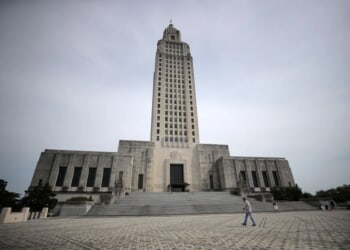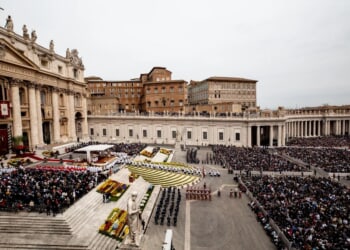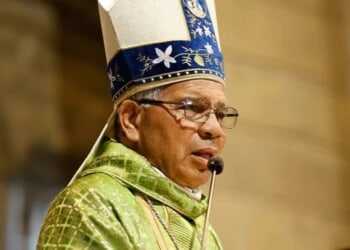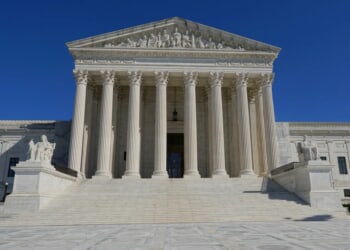My recent visit to Azerbaijan was nothing short of eye-opening. Nestled between Iran, Russia, Armenia, Georgia, and Turkey, this remarkable country stands as a unique fusion of East and West — a true hidden gem that too few Americans know about. Azerbaijan defies simple categorization. It’s a place where ancient traditions blend harmoniously with modern development, where East meets West, and where resilience, diversity, and hospitality are woven into the national fabric.
Azerbaijan is the only predominantly Muslim nation to supply oil to Israel … and maintains a robust diplomatic relationship.
One of the most striking things about Azerbaijan is its location — both geographically and culturally. Situated at the crossroads of Europe, Asia, and the Middle East, the country has long served as a bridge between civilizations. For centuries, it lay along the Silk Road, welcoming travelers, merchants, and emissaries from diverse cultures. This long history of cultural exchange has helped shape Azerbaijan into a society known for its openness and religious tolerance — values that are deeply embedded in its national identity to this day.
Through many centuries, Azerbaijan has absorbed influences from the Persians, Ottomans, Russians, and Europeans, yet it has maintained a distinct cultural identity all its own. The result is a society that feels both familiar and exotic, deeply rooted in tradition yet forward-looking and innovative.
In a region often defined by religious strife, Azerbaijan stands out for its harmony. It is a majority-Muslim country, but it is not defined by religious extremism. Instead, mosques, synagogues, and Christian churches stand side by side. Jews have lived in Azerbaijan for more than 2,000 years and continue to flourish there. Christian communities worship freely. Religious tolerance is not merely a government policy — it is part of the national ethos. The country’s history as a hub of trade and exchange has taught its people the value of welcoming those who look, speak, or pray differently. That spirit of pluralism could serve as a model for other nations in the region.
Some outside observers have misunderstood Azerbaijan’s ongoing conflict with neighboring Armenia, framing it as a religious war — a Muslim nation versus a Christian one. But that narrative misses the truth of what has occurred. Armenia, not Azerbaijan, initiated the conflict by occupying large swaths of internationally recognized Azerbaijani territory in the early 1990s. During this occupation, over a million Azerbaijanis were driven from their homes and lands. More than a million landmines were planted — not as a defense mechanism, but as a means to prevent those displaced families from ever returning to their farms, homes, and ancestral villages.
Azerbaijan has sought to resolve these issues through diplomacy and international law, but its patience was often met with delay. Eventually, Azerbaijan reclaimed its territory, not through conquest, but through liberation — a reassertion of its sovereignty over its own lands. The return of internally displaced persons to their rightful homes is now a national priority, but de-mining the area remains an enormous humanitarian and logistical challenge.
Historically, Azerbaijan has had its share of challenges. It was once part of the Russian Empire and later absorbed into the Soviet Union. But as soon as the Soviet Union began to collapse, Azerbaijan swiftly declared its independence in 1991. That decisive action speaks to the national spirit: proud, resilient, and determined. Despite the geopolitical pressures from powerful neighbors, the Azerbaijani people have built a thriving nation grounded in their rich heritage and cultural values.
What is perhaps even more surprising to some is Azerbaijan’s strategic alliance with Israel — a rare relationship in the Muslim world. Azerbaijan is the only predominantly Muslim nation to supply oil to Israel, cooperates closely on defense and intelligence, and maintains a robust diplomatic relationship. This is not a contradiction; it is a reflection of Azerbaijan’s pragmatic and tolerant worldview.
And for the United States, Azerbaijan is more than just a friend — it is a crucial strategic partner — offering intelligence and cooperation in the fight against terrorism. Its geographic location and political stability make it a key player in regional security and energy supply, further underscoring its significance beyond its borders. As a secular, pro-Western, energy-rich country that borders Iran, Azerbaijan plays a vital role in regional security and U.S. geopolitical interests.
The capital city of Baku is a vivid example of Azerbaijan’s dual identity — deeply rooted in history, yet looking boldly to the future. Walking through its streets, I was captivated by the contrast: the medieval stone walls of the Old City stand just blocks away from the ultra-modern Flame Towers that light up the night sky. It’s a city that honors its past while embracing the future. The city’s infrastructure, museums, art, and hospitality rival any global capital.
Beyond the capital, the Azerbaijani countryside is rich with beauty — from the Caspian Sea to the Caucasus Mountains. In towns like Sheki and Lahij, you can see centuries-old craftsmanship and architecture. The famous mineral springs of Naftalan, renowned for their therapeutic qualities, have been attracting visitors since ancient times. And Azerbaijani cuisine is a feast of flavors, with plov (saffron rice with meat and herbs), dolma (stuffed grape leaves), and kebabs, and freshly baked bread served with warmth and pride.
A Flourishing Nation
Economically, Azerbaijan is thriving. While its oil and gas resources are well known, the country is diversifying. Agriculture, tourism, technology, manufacturing, and logistics are all growing sectors. The government has invested heavily in infrastructure and modernization, making the country increasingly attractive for international partnerships and business development. The economic growth I witnessed during my visit reflects not just smart policy, but also the drive and ingenuity of the Azerbaijani people.
Azerbaijan’s strategic importance on the global stage is also worth noting. The country has been a reliable partner to the United States, offering intelligence and cooperation in the fight against terrorism. Its geographic location and political stability make it a key player in regional security and energy supply, further underscoring its significance beyond its borders.
What left the deepest impression on me, though, was the spirit of the Azerbaijani people. Whether I spoke to a shopkeeper, a student, a religious leader, or a government leader, I encountered the same warmth, dignity, and resilience. These are people who have endured war, displacement, and geopolitical hardship — and yet they exude optimism, hospitality, and a deep pride in their heritage.
In a world increasingly defined by division and suspicion, Azerbaijan offers a different story — one of coexistence, heritage, progress, and faith. It is a place that understands the value of building bridges, not walls. And it is a friend to the United States, not just in rhetoric, but in action.
Azerbaijan may not dominate the evening news, but it has a story that deserves to be heard — and a future that promises to be even brighter.
READ MORE:
To Govern in Mankind’s Foreign Policy Interest or in Trump’s America First Interest?
The Naivete of American Foreign Policy
George Landrith is the President of Frontiers of Freedom Institute – a public policy think tank devoted to promoting a strong national defense, free markets, individual liberty, and constitutionally limited government. Mr. Landrith is a graduate of the University of Virginia School of Law, where he was the Business Editor of the Virginia Journal of Law and Politics. He is admitted to the bar in Virginia and California and is also a member of the United States Supreme Court bar. As an adjunct professor at the George Mason School of Law, he taught constitutional law and appellate advocacy. His most recent book is Let Freedom Ring … Again: Can Self-Evident Truths Save America from Further Decline?


![NYC Tourist Helicopter Falls into Hudson River, Siemens Executive and Family Among Those Killed [WATCH]](https://www.right2024.com/wp-content/uploads/2025/04/NYC-Tourist-Helicopter-Falls-into-Hudson-River-Siemens-Executive-and-350x250.jpg)






![Green Day’s Cringe Trump Diss Ends in Fire and Evacuation [WATCH]](https://www.right2024.com/wp-content/uploads/2025/04/Green-Days-Cringe-Trump-Diss-Ends-in-Fire-and-Evacuation-350x250.jpg)
![Red Sox Fan Makes the ‘Catch of the Day’ with Unconventional ‘Glove’ [WATCH]](https://www.right2024.com/wp-content/uploads/2025/04/Red-Sox-Fan-Makes-the-‘Catch-of-the-Day-with-350x250.jpg)
![Bikini Clad Spring Breakers Prove Our Education System is Failing Students [WATCH]](https://www.right2024.com/wp-content/uploads/2025/03/Bikini-Clad-Spring-Breakers-Prove-Our-Education-System-is-Failing-350x250.jpg)





